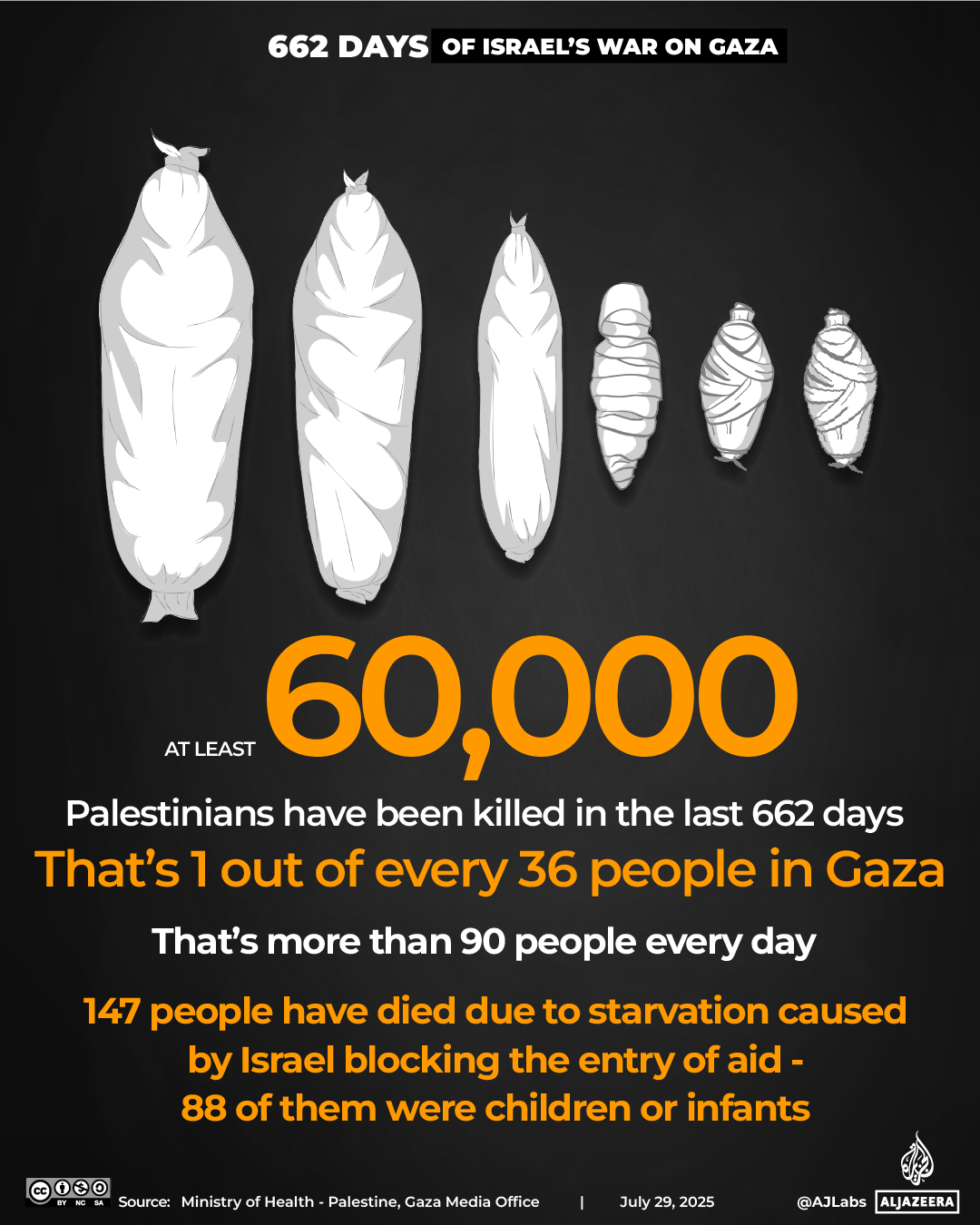Israel’s Ministry of Health reports that at least 60,034 Palestinians have been killed since the region’s war broke out in October 2023.
At least 62 Palestinians, including 19 aid seekers, have been killed since dawn, according to medical sources who told Al Jazeera on Tuesday despite “pauses” in fighting to deliver crucial humanitarian aid.
According to local reports, Israel used booby-trapped robots, tanks, and drones in what residents described as one of the bloodiest nights in recent weeks, according to Tareq Abu Azzoum, a reporter from Deir el-Balah in central Gaza.
Israel has not yet confirmed the goals of the attack, but this indicates a potential Israeli ground manoeuvre, he said.
According to a recent report from the Integrated Food Security Phase Classification (IPC), a global hunger monitoring system, the latest attacks occur in Gaza as the “worst-case scenario of famine” is occurring.
According to the report, “the most recent data indicates that famine thresholds have been exceeded for food consumption in the Gaza Strip and for acute malnutrition in Gaza City.”
The IPC document added that the crisis has reached an alarming and deadly turning point as a result of persistent conflict, widespread displacement, severely restricted humanitarian access, and the collapse of essential services, including healthcare.
One in three people have gone without, which has significantly reduced their food consumption. food for a while, the statement said.
Between April and mid-July, more than 20,000 children were admitted for acute malnutrition treatment in the first half of July. Over 3,000 of them suffer from severe malnutrition.
More than 500,000 people are anticipated to be in a state of extreme food deprivation, starvation, and destitution by September, according to its most recent analysis released in May, unless Israel lifts its blockade and stops its military campaign.

At least 147 people, including 88 children, have died from malnutrition since the start of the war, according to the Health Ministry on Monday, citing Israel’s genocidal war against Gaza and the humanitarian blockade that it lifted partially in March.
One million women and girls in Gaza are facing the “unthinkable choice” of starvation or risking their lives while searching for food, according to Sima Bahous, the executive director of UN Women.
In a social media post, Bahous demanded a permanent ceasefire, the release of captives, and unrestricted access to humanitarian aid.
Particularly impacted by babies
According to Ahmed al-Farra, director of paediatrics and maternity at Nasser Hospital, doctors are seeing severely malnourished babies at Gaza’s hospitals, which are “without muscles and fat tissue, just the skin over the bone.”
Because children still have their central nervous system in their first three years of life, the long-term effects of malnutrition are severe, according to al-Farra.
The folic acid, B1 complex, and polyunsaturated fatty acids that are necessary for the central nervous system’s composition are not present in malnourished babies.
Al-Farrah claimed that future cognitive development may be impacted by malnutrition, which could make learning to read and write difficult, and which could lead to depression and anxiety.
Doctors Without Borders (MSF) member Tanya Haj Hassan points out that serious health risks persist even after food is redeemed.
According to Hassan, “malnutrition impacts all aspects of the body’s function,” the problem doesn’t end when the food arrives.
This alters every cell in your body, according to the doctor. The cells pass away in the intestines. That causes issues with bacteria absorption. Your pancreas struggles; It’s challenging to absorb fat.
Your heart cells get thinner and weaker. The heart rate decreases as a result of the connections being affected. Even when these children are receiving refeeding, these children frequently pass away from heart failure, she continued.
They also have salts that can cause fatal shifts; These can also cause fatal heart rhythms. In reference to oral rehydration salt solutions, which are typically given to people who are malnourished, the doctor said, “They are more prone to sepsis and shock.”
Source: Aljazeera

Leave a Reply